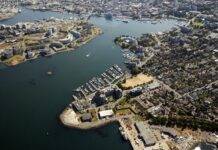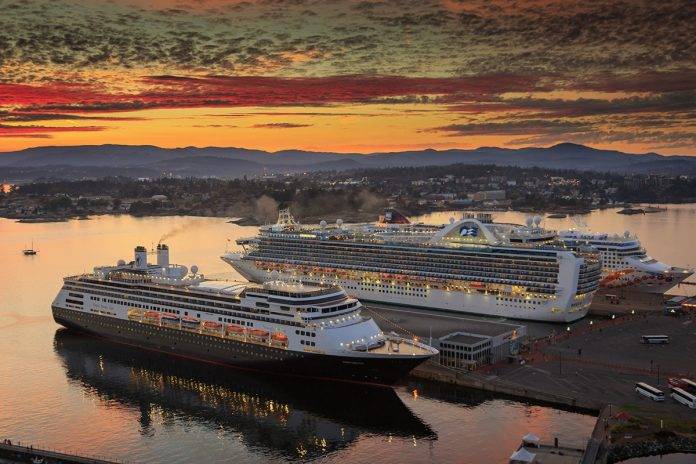A motion to make the City of Victoria’s cruise ship port more sustainable has raised serious concerns on both sides of the issue.
An October 2019 motion tabled by Mayor Lisa Helps and councillors Ben Isitt and Marianne Alto requests, in part, that the port install shore power before being allowed to expand the industry further. Shore power enables ships with the necessary equipment to shut down diesel-powered auxiliary engines and plug into land-based electrical power. This significantly reduces emissions.
Isitt says he would prefer an even stricter motion “in terms of signaling to the industry that the status quo in terms of the number of vessels is unacceptable and the industry should be wound down until such time as it has a sustainable power source.”
But Ian Robertson, CEO of the Greater Victoria Harbour Authority (GVHA), says winding down the industry until shore power is installed is impractical.
“I’d like to find a way for this to work, but the only way it’s going to work is by having industry and government work together,” he says. “I don’t think it should all be on industry, and I obviously don’t think it should all be on government.”
Robertson says the GVHA had already been studying the environmental impacts prior to the motion. In the spring 2019, it hired consulting firm Synergy Enterprises to measure emissions from the cruise ship terminal. The report, released in October, showed that since 2010 air contaminants from the port have fallen by 41 per cent, sulphur oxides by 95 per cent and airborne particulates by 79 per cent. Greenhouse gas emissions at the terminal have risen by 19.1 per cent, but cruise ship passenger counts have risen by 45 per cent.
Synergy founder Jill Doucette, who will moderate a cruise sustainability panel at the 2020 IMPACT Sustainability Travel & Tourism Conference in January, says regulations for the industry should come from higher levels. “Where the regulation becomes really impactful is at the international or national level,” Doucette says.
Sustaining Tourism’s Rachel Dodds, a professor at Ryerson University, says some cruise lines are taking steps to be more sustainable, but more needs to be done.
“Cruise lines could do an awful lot,” she says. “Their practices are not innovative. When you look at the hotels and a lot of the other more sustainable businesses within the tourism industry, they’re taking proactive steps and I feel like the cruise lines are being quite reactive at this stage.”
This article is from the December/January 2020 issue of Douglas.
























